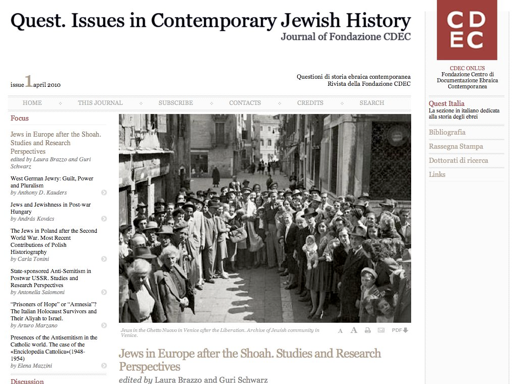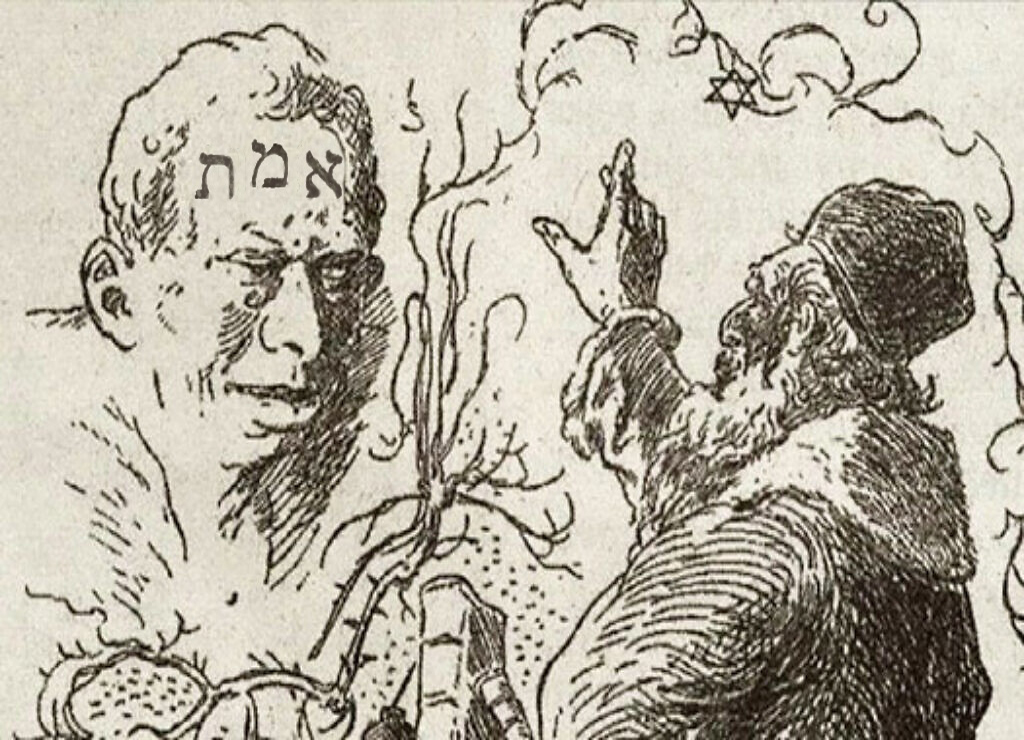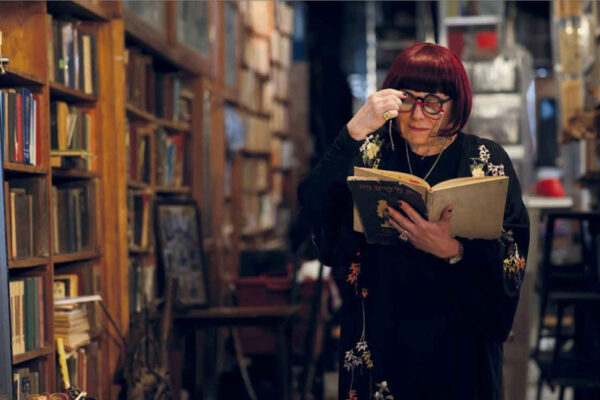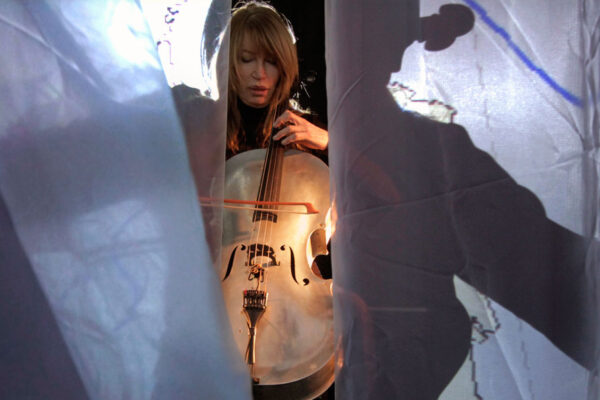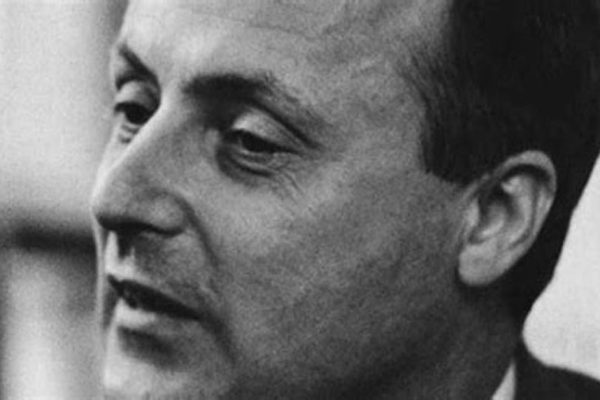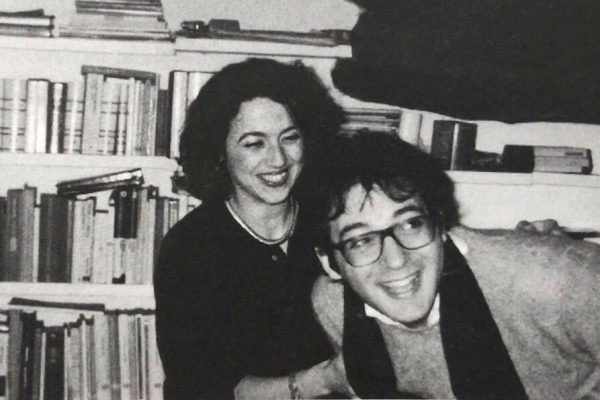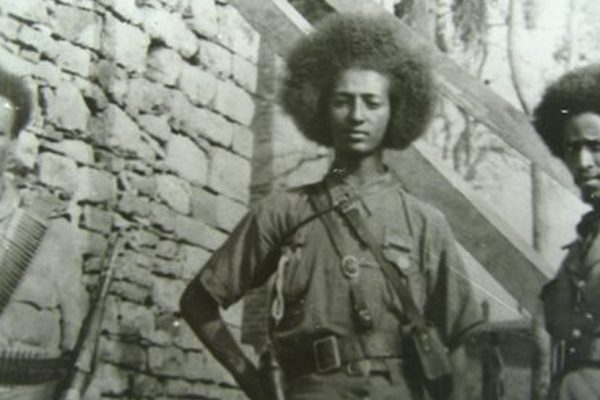The Center for Contemporary Jewish Documentation in Milan Launches Online History Journal: Quest
Alessandro Cassin interviews Michele Sarfatti, historian and director of CDEC
Founded in Milan in 1955 on the ten-year anniversary of the liberation of Italy from the Nazis and the fall of the Fascist Social Republic, CDEC has become the foremost Jewish Contemporary Documentation Center in Italy. By virtue of its special commitment to documenting, researching and preserving the memory of the Shoah, the CDEC Foundation came to be regarded as the “place of memory” for the thousands of Italian Jews who were deported and murdered. Structured as a non profit organization (ONLUS), it is an independent Institution for the study of Italian Jewish History and Culture. Carried for many years by the sheer force of dedication of its core group of researchers, CDEC was at last legally recognized by Italian Presidential Decree in 1990. As of late, the Italian Government is threatening to deal a heavy blow by cutting the Center’s funding in half.
As stated on their web site www.quest-cdecjournal.it/ “Quest is a journal devoted to historical research and historiographical debate on Jewish life and history in the period between the mid-18th and the beginning of the 21st century. It’s intention is to be inclusive of all Jewish realities as they developed in the modern period from the ancient Mediterranean communities originating from the Spanish and Portuguese Diasporas up to the ‘newer’ Eastern and Central European Jewish experiences and later American Jewish and Israeli history”.
Tullia Catalan, Cristiana Facchini, Gury Schwarz, Michele Sarfatti and Marcella Simoni make up the editorial board, lead by Laura Brazzo.
What follows is a conversation with Michele Sarfatti, Director of CDEC, Editor in Chief of Quest and author among other works of the seminal The Jews in Mussolini’s Italy: from Equality to Persecution, translation by John and Anne C. Tedeschi, The University of Wisconsin Press, Madison 2006.
Alessandro Cassin. Quest is CDEC’s first magazine; had you considered producing one before?
Michele Sarfatti. Over the years the idea of a magazine has come up often, but nothing came of it. We were lacking two things: sufficient funding and the right person to lead it. I am convinced that in order to be successful any magazine needs – besides an editor in chief and a strong editorial board – a person who becomes the heart of the project. In this case we have found her in Laura Brazzo.
A.C. How did the idea of Quest take shape?
M.S. Some of our younger researchers came up with the idea and presented it to us. Quest was born after about a year of heated discussions. .
A.C. Who is the intended target?
M.S. The magazine is aimed at scholars in the broadest sense. It is meant to stimulate and promote debate among researchers, academics as well as the general public. Its creators are young, (but in Italy one is perceived as young into their forties!) whose point of reference is the academic world.
A.C. You mentioned that Quest represents both a challenge and act of defiance…
M.S. Quest is a leap of faith for several reasons.
In Italy there are relatively few online only magazines. Our choice was dictated both by its lower cost and by our conviction that the future is digital. We have extended our historical timeframe. While CDEC normally concentrates on the 19th and 20th Centuries, Quest’s scope of inquiry goes back to the 18th Century.We opted for a publication in English in a country where even in the scientific community it is not yet as widely used.
A.C. The magazine is in English, except for an area called Quest Italia…
M.S. We decided to have a section in Italian, conceived as a service area that would help navigate the magazine for those readers who’s English is tentative.
A.C. You are both the director of CDEC and Quest’s editor in chief. Can the magazine be a truly autonomous entity?
M.S. Quest is only one of CDEC’s many initiatives, and will function independently. Recently we have given a lot of thought to CDEC’s online presence, which is still a work in progress. Our aim is to have a well-organized galaxy of autonomous sites rather that one single monster site. If you go to www.CDEC.it you will find that it contains other autonomous yet related entities, among others, Osservatorio sul pregiudizio antiebraico contemporaneo that contains updated information on the various anti-Semitic manifestations in contemporary Europe and Italy and www.museoshoah.it.
A.C. CDEC’s main web page, an invaluable resource in itself, features among others, I volti della memoria an arresting online photo gallery of the Jews deported from Italy, as well as Rassegna stampa, a comprehensive overview of articles on Jewish topics from the Italian press.
Your declared intention is to cover the last three centuries of Jewish history in the pages of Quest. However, your first issue deals mostly with contemporary events.
M.S. Our first issue has The Jews in Europe after the Shoah as its monographic theme. This does not change our commitment to cover the entire period ranging from the beginning of the modern age to the present.
A.C It is surprising to start a scholarly history magazine with contemporary issues; how did you arrive at this decision?
M.S. We are accustomed to thinking of history as something that ends in 1945, after which it is considered chronicle of current events. Here we wanted to establish that it is possible to pose historical and historiographic questions regarding the period following the Shoah.
A.C. Geographically, the first issue focuses on Europe…
M.S. We did not touch upon America or Palestine/Israel only because we wanted to focus on the areas that had been directly touched by the Shoah. In the future we will definitely focus on a vast territory extending from Warsaw to Trieste, New York and Tel Aviv.
A.C. Can you give us a preview of your next issue?
M.S. The theme will be the relationship between Jews and cities. Not strictly “Jewish cities” (in which case we would have to restrict ourselves to Tel Aviv) but rather those cities where a strong Jewish presence became one of the elements of modernization. We start with 17th and 18th Century Amsterdam and end with New York, a prime example of Jews entering the urban areas and becoming agents of change.
A.C. The format of the first issue is a monographic theme followed by Discussion and a Review sections. Will this be the standard for the coming issues?
M.S. Most likely it will. The first issue was still in some sense an experimental one. It became apparent that once we set the format and the underlying structure it would be both complicated and costly to make major changes. We had contemplated the idea of expanding the Discussion section, but here we ran into a theoretical conflict. The online format offers the possibility of updating and changing our content. However we felt that doing this would change Quest’s identity from an online magazine into a cultural debate platform.
A.C. There is a fine line between a web magazine and a web site.
M.S. Indeed. And we wanted a web magazine. When you produce a print publication, as you close an issue and send it to the printer, it is done. With a web magazine, there is the constant temptation to add content, and to keep each issue open.
A.C. As institutions would, CDEC grows and evolves. Can you tell us about what you foresee as its scope and objectives in the near and long term future?
M.S. Clearly our focus remains the history of Italian Jewry within Italian society. We do not deal with strictly religious issues; other institutions do that. I see CDEC’s role as that of an institute capable of addressing a wide range of questions and requests, coming from all sectors of society. We should be able to be a point of reference for the academic world – producing innovative research, a scholarly magazine etc.- as well as open a dialogue with and provide guidance to high school students. For the last three years we have also presented a cycle of new Israeli movies in Milan. In the future we are planning to open an educational center aimed at elementary school children. This large variety of activities constitutes the real richness of our research center.
A.C. How does Quest fit in the vision you have for the future of CDEC?
M.S. We see the magazine as one of the ways to open up a discussion with the rest of the world and enter into a dynamic exchange with researchers and scholars. Nowadays all of this is greatly facilitated by the use of English and the electronic media.


